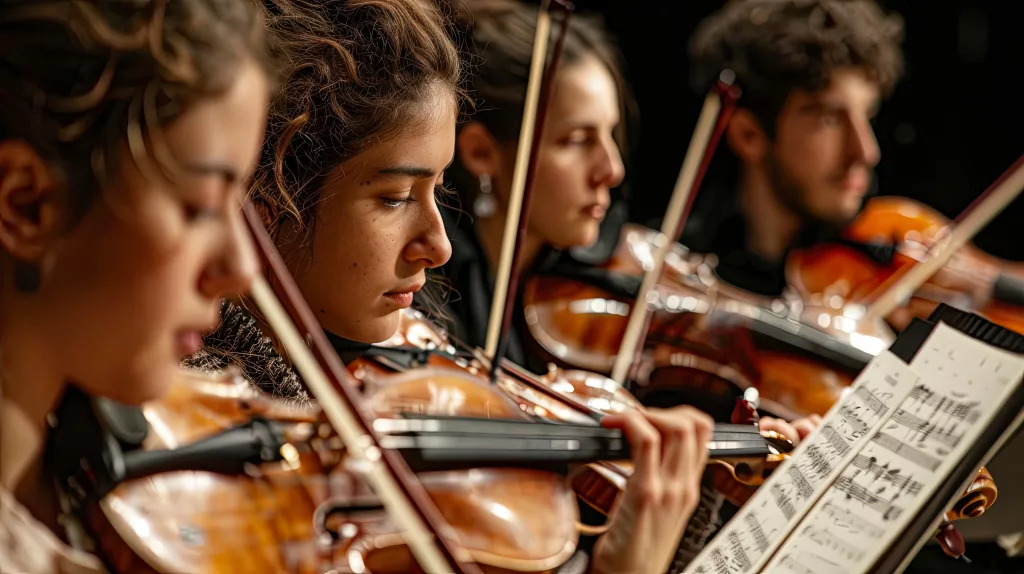Looking for creativity, productivity and connection? Music may be the answer.
Music innately does something to human beings. It can help us focus, drive behavior, calm us, affect our mood and impact us on an even deeper level – creating connection, and making us more generous and empathetic. And today, we as a nation may need that more than ever.
It’s no secret that music is a powerful force: six in 10 Americans say a day without music is worse than a day without human interaction, writes Keith Blanchard’s book, Reverberation: Do Everything Better with Music.
Music can assist in pretty much everything we do– both at work and in our personal lives. For instance, employees who listen to music complete tasks faster and generate better ideas. Surgeons who listen to certain kinds of music before surgery operate more efficiently and accurately, and athletes, too, work out longer and harder with better performance.
“It has a real and profound impact on your day, from what you wake up to, what you sing in the shower, how you navigate your commute or how you prep for meetings,” says Michael Hermann, co-founder and CEO of Reverberation, which published the above book and now has immersive tech projects to help schools and employers harness music intentionally for collaboration, focus and productivity.
“It’s helping spur creative thoughts in meetings, it’s helping to create and enhance sales strategy, and the science shows there’s a definitive change in the brain state by creating music and listening to music together,” he says.
The Right Music Can Boost your Productivity
The right kind of music can rev up productivity and focus. Ambient music without words can isolate your brain from outside sounds, writes Blanchard. He recommends EDM music or video game soundtracks, in particular, for heavy-concentration tasks.
Harvard neuroscientist Srini Pillay also says that familiar songs, the ones you know best, are the most effective for maximizing concentration. There is no one-genre-fits-all, either: it’s whatever you respond to, and the kind of music you listen to will vary upon your mood. You can wear yourself out on certain songs, however. If your brain gets tired of it after repetition, the impact of that music decreases.
The challenge for productivity is ensuring the music isn’t sapping your attention and proving to be distracting, so it’s best to stick to songs that are in the same genre and same tempo for a work session. Just make sure you like it: one study found that people scored lower on reading comprehension when listening to music they didn’t like compared to silence.

Music Can Change Your Mood
Let’s say you start your day with music, instead of an alarm, you will likely find your energy will gradually rise to match the song and increase alertness, writes Blanchard. If you exercise that morning with some music, it can help fight stress, anxiety and depression and give you the extra energy you need to get the workout done, boosting endurance by 15%.
Research also shows that the physiological and physical symptoms of stress can be decreased when listening to music and performing music. Why? Music minimizes blood flow to your “fear center” amygdalae, which in turn lowers the production of stress and cortisol, writes Blanchard.
Music also increases dopamine levels, so you feel generally happier and less concerned. In fact, our favorite music can make us feel so good that it’s just as if our brain were reacting to delicious food or a psychoactive drug, according to one new study published in Nature Neuroscience. The study found that people had a 6% to 9% increase in dopamine levels —and one person saw a 21% jump— when they listened to their favorite music. There’s a reason why Plato called music “the medicine of the soul.”
Music Can Make Us Creative
A new study found that people who listened to happy music had more creative and innovative ideas than those who listened to other kinds of music. The study suggested that music can enhance the cognitive flexibility to come up with innovation and switch between different concepts and perspectives.

-Adobe Stock
Part of that creativity is tied to brainwave patterns induced by certain kinds of music.
Blanchard suggests that leaders put together a two-part classical playlist for brainstorming sessions. Classical, he writes, has been shown to challenge the brain and inspire creativity, and because it’s probably not familiar, it won’t be distracting. He recommends fugues or chamber music for the first half to open up alpha waves for creativity, and then for the second half, perhaps some Vivaldi to boost beta or gamma wave patterns, used when engaged in intense mental activity, such as problem-solving, learning, or critical thinking.
Music Improves Our Memory
Studies have shown that music helps us make new memories as well as retrieve old ones.
Songs can serve as “post-it notes” that let us remember certain information and events because it engages the hippocampus and prefrontal cortex parts of the brain, which are associated with memory and emotion.
“A song engages multiple parts of your brain—the incoming sound wave lights up your auditory cortex, the rhythm perks up your motor center, the lyrics engage the language center, and the emotional content primes the limbic system—giving the memory a broader footprint inside your head,” writes Blanchard.
Music Can Change Our Behavior
Music can also change people’s behavior. Musical anthems, such as Michael Jackson’s “Heal the World” to the Black Eyed Peas’ “Where Is the Love?” can make people more “prosocial,” or more compassionate and kind. One study found it helped people come up with positive word associations, give money to charity and help out other people. They can also make people more cooperative, especially when they’re dancing.

-Adobe Stock
Whether it’s singing your team’s fight song, belting out a song with five thousand people at a concert or humming tunes with friends at a campfire, music inspires a feeling of being like-minded and connected.
Music creates what is known as “social flow” by releasing endorphins, inducing oxytocin, the neurotransmitter responsible for social recognition and relationship and attachment. It also improves communication and fosters connections with other people.
Whether you’re looking to get in the zone, boost your mood, get creative or connect with your team, music is an inexpensive and powerful tool that allows you to harness all the best and most powerful parts of your brain.
